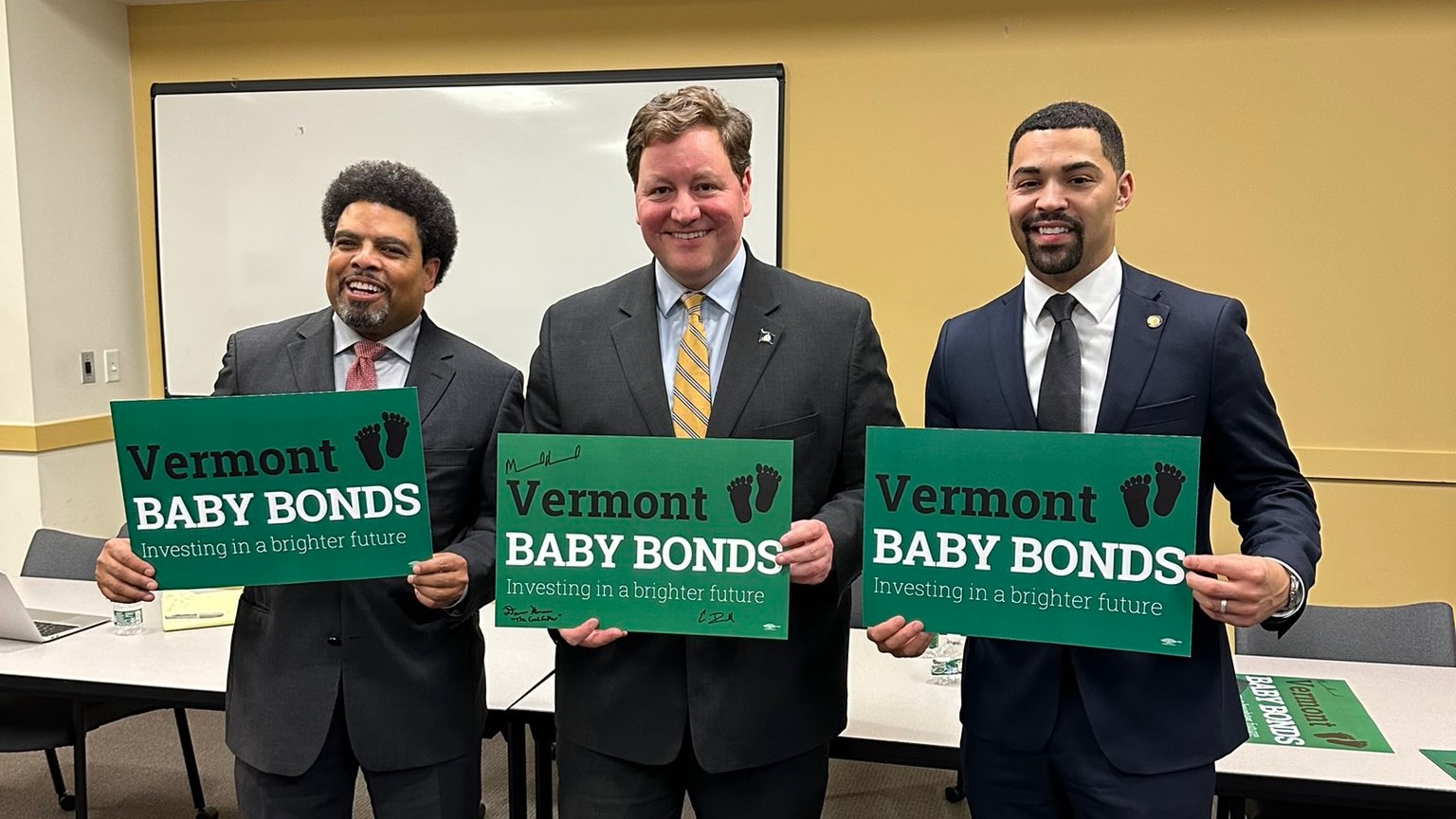By Mike Pieciak | February 14, 2024

Baby Bonds are an increasingly popular government policy in which every child born into poverty receives a publicly funded trust account at birth, providing them with “start-up capital” to pursue fulfilling, productive, prosperous, and self-directed lives. Follow our Baby Blogs series to learn about the vision, politics, and people behind Baby Bonds and their transformative impact on the lives of young people, their families, and communities.
In this installment of Baby Blogs, Vermont State Treasurer Mike Pieciak discusses how Vermont’s Baby Bonds proposal reflects the state’s core values and can help address Vermont’s most pressing challenges.
Vermont recently joined Massachusetts, Rhode Island, and states across the country in introducing Baby Bonds legislation. The Vermont proposal would automatically enroll every child born on Medicaid, providing a $3,200 investment available to the individual at age 18-30 for wealth-building activities.
Our state has often stood out for our small size and commitment to community, embodied in traditions like in-person town meetings and the preservation of our general stores. But as Vermont continues to emerge from the COVID-19 pandemic, the state faces challenges and disparities including a high cost of living, demographic trends, and inequality between rural and urban areas.
Securing Vermont’s economic future will require bold action from lawmakers, making Vermont a compelling candidate to join Connecticut as the next state to pass Baby Bonds legislation.
Integral to Vermont’s economic future is confronting our state’s demographic challenges, and central to this is building and growing our workforce. Though our state revenues have never been higher, the proportion of working-age Vermonters relative to our state’s overall population is shrinking. In 2010, working-age Vermonters (ages 25 to 64) made up 54.5 percent of the state’s population. That figure dropped to 50.5 percent in 2022.
Meanwhile, our state is growing older. From 2010 to 2022, the population of Vermonters age 65 to 79 grew by about 44,000 (up 67 percent). Meanwhile the population of Vermonters age 0 to 17 shrunk by about 14,000 (down 11 percent). With birth rates decreasing during the COVID-19 pandemic, the proportion of children in Vermont’s population declined.
Vermont’s demographic challenges worsen the economic gap between rural and urban communities. Last summer, these inequities worsened as the state endured a historic flood, hitting rural communities hardest and resulting in major losses.
Preliminary data indicates over 4,000 homes and 800 businesses were damaged. Eighteen percent of homes damaged were reported no longer habitable, adding pressure to our state’s severe housing shortage. This shortage in affordable and available housing has led to low vacancy rates, high median rental prices, and a less affordable state overall, culminating in Vermont having one of the highest rates of homelessness per capita nationwide.
Addressing these challenges will require bold solutions. Enter Baby Bonds. At its core, the proposal aims to address intergenerational poverty and empower young Vermonters to invest in their futures, offering a lifeline to build wealth without the burden of crippling debt.
With a higher percentage of Vermont births on Medicaid, the policy would disproportionately benefit Vermont’s rural communities, particularly in the Northeast region of the state where over half of children are born on Medicaid.
In the face of devastating climate events, which historically have disproportionately damaged our rural communities, Baby Bonds would support rural Vermonters’ economic resilience and lay a foundation for their long-term financial stability. Vermont’s climate is becoming warmer and wetter, and these events will surely recur. Proactive solutions like Baby Bonds will make rural communities more resilient.
Baby Bonds also have the potential to help our state retain young people. Providing financial incentives for young people to stay in Vermont can help ensure a more steady stream of talent for our businesses and industries. A program like Baby Bonds could also serve as a draw for young families thinking about putting down roots in Vermont.
Though Baby Bonds is not a silver bullet to addressing poverty and wealth inequality, the proposal would help Vermont chart a course toward sustainability and growth. Since being introduced in the Vermont House, the bill has gained tri-partisan support from lawmakers from across the state. It will likely be one of the first major bills voted out of the House Commerce Committee, before heading to the money committees who will vote on the program’s funding. With about 2,000 babies born each year on Medicaid in Vermont, the program would amount to a roughly $6.4 million appropriation.
A bold policy like Baby Bonds requires a funding source that is equally ambitious, yet simple. To fund the Vermont Baby Bonds program, the Treasurer’s Office has proposed using our annual unclaimed property transfer to our state’s general fund. This funding mechanism would ensure no new taxes or fees for Vermonters.
Creating a Baby Bonds program in Vermont stands as more than just a solution to our pressing issues; it signifies a dedication to supporting families and cultivating healthy, resilient communities that look out for one another. This commitment is woven into the fabric of our state’s identity. We hope to join other states across the country in implementing this impactful program, which promises to create a more resilient, fair, and productive economy for all.
Mike Pieciak was inaugurated as Vermont’s 31st State Treasurer in January 2023.
If you missed previous installments of our Baby Blogs series, read them here.
Learn more about Baby Bonds in Vermont.
To share feedback on this blog, or for questions about Baby Bonds, email David Radcliffe at [email protected].
To learn more, explore our Baby Bonds resources.

